How to Become a Sports Photographer
The following guest post was contributed by Christine Howell who frequently writes about online photography schools and college related topics for Online College Guru, an online college directory and comparison website.
THREE STEPS TO SUCCESS
If you are interested in photography, you may wish to specialize in a particular field, such as sports photography. Sports photography can be a very lucrative field, but just like professional sports, it’s not all fun and games. You will need to put in the work to become a professional sports photographer, and this article will help introduce you to the rewarding world of photographing professional sports.
1. Get the Right Equipment
Sports photography calls for different gear than other types of photography. The action can be explosively fast, and the shot can be over in fractions of a second, so you will need a camera with a continuous-focus servomotor to capture the athletes as they move closer and farther away from you without having to constantly refocus.
Also, it is necessary to have a continuous shutter function (burst), so you will have several photographs of the rapid-paced action from which to choose the best shot. 8 frames per second is the professional standard for continuous shutters.
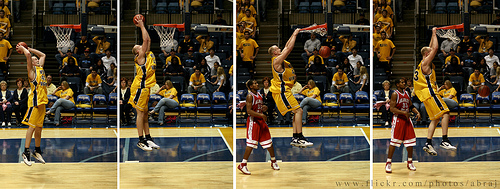
photo credit: Abdullah AL-Naser
Try to also find a camera with the highest ISO settings that produce least amount of noise. Last but not least, a zoom lens or prime lens, preferably with the largest aperture you can find with IS.
2. Get Some Experience
Vantage point is more important than venue, so clearly you will be better off on the sidelines of your local high school baseball game than in the stands at the World Series. Start local and get a feel for your subject matter. Concentrate in a sport you understand, because then you can anticipate where the action will be. If you don’t quite “get” baseball strategy, you won’t be able to anticipate where the fielding team will choose to throw the ball or where the batter is likely to aim it. On the other hand, look for shots that are less obvious: an emotional reaction from the stands or from the bench might have more impact than a clean slam-dunk or a runner crossing home plate.
3. Plot Your Career
Obviously Sports Illustrated isn’t going to be flying you to the Superbowl without a lot of experience under your belt. You will have to start small, local, and yes, probably free, to build up your portfolio. Volunteer to take some official photographs at a little league game or school match. Once you get some nice shots, you can pursue paying gigs, eventually working your way up to the big leagues. It is very worthwhile to subscribe to industry magazines for tips from established sports photographers, and registering on a website like https://www.sportsshooter.com/ will give you access to forums, contests, tips and a classified section to buy and sell equipment or advertise for jobs.
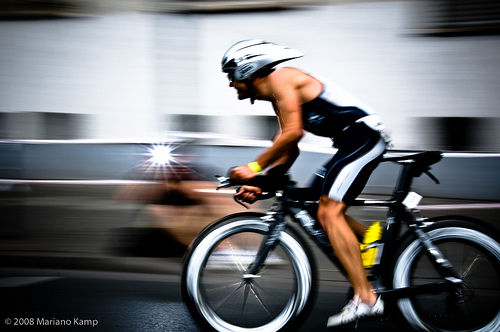
photo credit: Mariano Kamp
So there you have it. Each step will take an investment of time and a bit of money, but if you want to become a sports photographer, it will certainly be worth it to end up with an exciting career that pays well and is a lot of fun—what’s not to like?
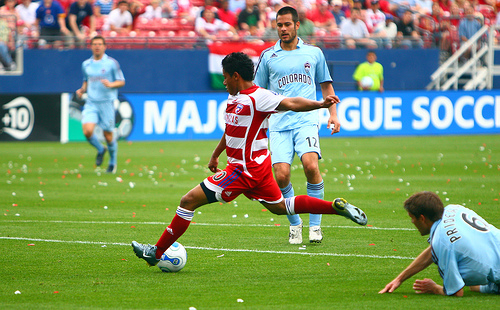
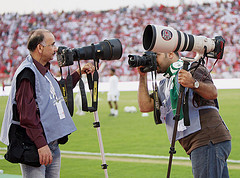
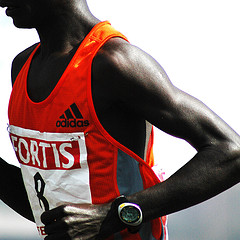
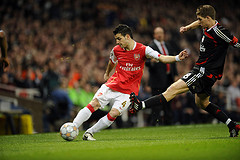
Bruce Elliott
October 28, 2009Thanks for this one. Enjoyed it.
If you’ve never shot action, local sport is a great place to start… purely for the fun of it. I shoot local sport for enjoyment, and do portrait work and school classes / teams for income. I love shooting sport, but I wouldn’t want to work the hours required to do it professionally. As a hobby you need a dSLR and at minimum a 70 – 200 for outside sport (if you can get close to the pitch and you’re willing to crop in post-processing. I started with a Nikon D70 and a 70-300mm F4-5.6 a few years back now. Struggled in low light, but absolutely fine on a sunny day. For pro work you need a completely different set-up, and brace yourself for the cost!
Kevin Winzeler
October 29, 2009Nice article. I’d add one thought to #2 “Get Experience” – I’d suggest getting experience in the sport your shooting; even at a small level. Photography is about carrying emotion through to the viewer and if you know how it feels to finish a triathlon for example or score a goal, it will be easier to translate that emotion to the viewer. I’m not suggesting you have to be an all-star athlete by any means, but definitely get experience on some level. I’m a professional sports photographer located in Utah and have found this particularly true for what I shoot.
Check out my work here:
Sports Photography – Kevin Winzeler
brett maxwell
November 3, 2009and learn how to shoot with both eyes open so you don’t get run over!
Wil
November 4, 2009Thanks for the tips. For those who can’t afford it, check your local photography store and see if they rent lenses out. Alot of the bigger stores around here will rent lenses at somewhat reasonable rates. I’ve tried to shoot the local NBA team here a few times, but without a quality lens, it’s really difficult to get good shots. I think for indoor sports, your equipment will make a huge difference!
brett maxwell
November 13, 2009anyone got a 400 2.8 they want to let me borrow 🙂